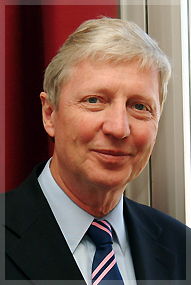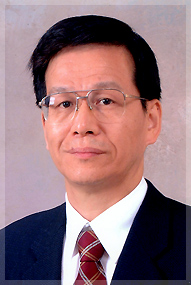The 2010 Keio Medical Science Prize Awardees
Jules A. Hoffmann, Ph.D.

CNRS (Centre national de la recherche scientifique) Institute of
Molecular and Cellular Biology, France
Professor, University of Strasbourg, France
Reason for Selection and his Major Achievement:
Theme: Discovery of insect-innate immune system and Toll receptor
Innate immunity is an essential host-defense system, which participates in the elimination of microbes from the body. The molecular mechanism of the innate immune system, especially the way of recognition of microbes, had been uncovered for a long time. Dr. Jules A. Hoffmann and his colleagues discovered that Drosophila Toll gene plays essential roles in innate immunity by using genetic approaches. Drosophila Toll functions as a sensor for microbes and activates intracellular signaling pathways, thereby inducing anti-microbial peptides. Their discovery is a breakthrough for the investigation of innate immune system of mammals, and leads discovery of mammalian Toll like receptor and role of their anti-microbial functions. Their findings are also contributes to the understanding of human immune systems and used for the development of adjuvant for vaccines and new anti-viral agents.
Background
- 1962
- Laboratory Assistant at the Faculty of Sciences of the University of Strasbourg
- 1963
- Research Training Assistant, CNRS
- 1964-1968
- Research Assistant, CNRS
- 1969-1973
- Research Associate, CNRS
- 1974-2009
- Research Director, CNRS
- 1978-2005
- Director of the CNRS Research Unit 9022 "Immune Response and Development in Insects
- 1987
- German Academy of Sciences Leopoldina
- 1992
- French National Academy of Sciences
- 1993
- Academia Europaea
- 1995
- Member of EMBO (European Molecular Biology Organization)
- 1993-2005
- Director of the Institute of Molecular and Cellular Biology, CNRS, Strasbourg
- 2003
- American Academy of Arts and Sciences
- 2006
- Russian Academy of Sciences
- 2007-2008
- President of the French National Academy of Sciences
- 2008
- National Academy of Sciences (NAS)
- 2008-Present
- Emeritus Distinguished Class Research Director at CNRS
- 2008-Present
- Invited Professor at Strasbourg University
Shizuo Akira, M.D., Ph.D.

Director
Immunology Frontier Research Center, Osaka University, Japan
* Website (Laboratory of Host Defense, WPI Immunology Frontier Research Center)
Reason for Selection and his Major Achievement:
Theme:Elucidation of molecular mechanisms of innate immune response for microbes
Immune systems are classified into two subsystems: the innate and adaptive immunity. Molecular mechanisms of innate immune responses had not been well understood, in contrast to microbe recognition by T/B cell receptors on lymphocytes in adaptive immunity. Dr. Shizuo Akira extended the study on Toll like receptor(TLR) which had been identified as a molecule involved in innate immunity of fruit fly. Dr. Akira established various TLR knock out mice, and revealed roles of TLR in innate immunity, including identification of microbe molecules corresponding to each TLR, downstream TLR signalings, and TLR-regulated immune responses. Furthermore, by identifying microbe sensor mechanisms other than TLR, Dr Akira made a great contribution for elucidation of molecular mechanisms of innate immunity. These results may lead to the further understanding on immunopathology of various diseases and development of strategies to regulate immune responses. The Keio University Medical Science Fund praises Dr. Shizuo Akira's achievement by awarding him the 2010 Keio Medical Science Prize.
Background
- 1977
- M.D. Osaka University, School of Medicine
- 1977-1978
- Clinical Training at Osaka University Hospital
- 1980-1984
- Ph.D. Osaka University, School of Medicine
- 1978-1980
- Physician in the Department of Internal Medicine, Sakai Municipal Hospital, Sakai, Osaka
- 1984-1985
- Fellowship of the Japan Society for the Promotion of Science in the Institute for Molecular and Cellular Biology, Osaka University
- 1985-1987
- Research Fellow in the Department of Microbiology and Immunology, California University, Berkeley
- 1987-1995
- Associate Professor in the Institute for Molecular and Cellular Biology, Osaka University
- 1996-1999
- Professor of Biochemistry, Hyogo College of Medicine
- 1999-present
- Professor of Department of Host Defense, Research Institute for Microbial Diseases, Osaka University
- 2007-present
- Director, WPI Immunology Frontier Research Center (WPI-IFReC), Osaka University
